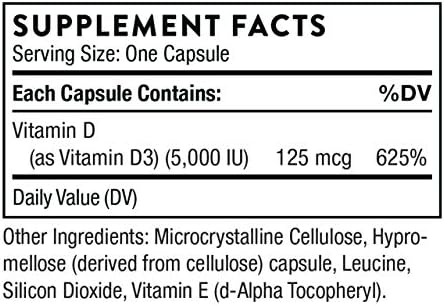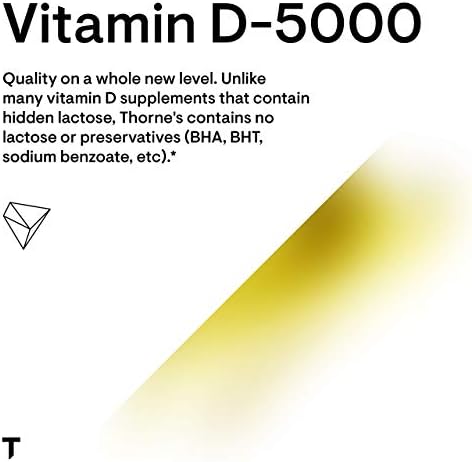








Price: [price_with_discount]
(as of [price_update_date] – Details)
Product Description
This information is provided to help you make an educated choice. Remember to talk with your health-care professional before starting a supplement regimen. Mayo Clinic does not endorse any non-Mayo products or services. Mayo Clinic has authorized Thorne Research to distribute Mayo Clinic health information as part of its commitment to serve as a reliable resource for the public.


Published 12/09/2016
What is Vitamin D?
Vitamin D is an essential bone-building vitamin. Your body can absorb calcium — the primary component of bone — only when sufficient vitamin D is present. Vitamin D also supports muscles, nerves and the immune system.* Low levels of vitamin D are linked with a range of health risks and adverse consequences.*
What are the dietary sources of vitamin D?
In the United States, most dietary vitamin D is obtained from fortified foods, such as breakfast cereals, milk and some yogurts. Some brands of orange juice, margarine and soy beverages also are fortified with vitamin D.
Very few foods naturally contain vitamin D, although there is a small amount of vitamin D in:
Fatty fish, such as salmon, tuna, herring, mackerel and sardines Beef liver Cod liver oil Cheese Egg yolks Some mushrooms
Should I consider taking Vitamin D?
Vitamin D deficiency — defined as a vitamin D level below 20 nanograms per milliliter (ng/mL) — is relatively common in the United States. One large survey found that 42 percent of the population was deficient. Many experts believe that for optimal health, blood levels of vitamin D should be at least 30 ng/mL.
For many people, it’s tough to get enough vitamin D. Direct exposure to sunlight is the most efficient source of vitamin D; however, depending on where you live and your lifestyle, sunlight can be difficult to come by in the winter. In warmer months, it’s wise to avoid too much sun or block it with sunscreen. This is generally a smart move, but it means you won’t get as much vitamin D from sunlight.
You could be at a higher risk of vitamin D deficiency if you:
Engage in indoor athletics rather than sports that get you outside in the sun Have limited sun exposure for other reasons, such as clothing choices Have a hard time absorbing fats due to a health condition such as a chronic bowel disease or a surgical procedure such as a gastric bypass Rarely go out in sunlight or have limited sun exposure due to your occupation Live in the northern latitudes Have a darker skin tone, which can act as a natural sunscreen Regularly wear sunscreen with a sun protection factor (SPF) greater than 8 Are an older adult (the risk of deficiency starts at around age 50 and increases with age) Are obese A healthy diet might not be much help either. Because few foods naturally contain vitamin D, many people fall short of the recommended amount needed for good health. If you’re not getting enough vitamin D in your diet, you can make up the difference with a dietary supplement.* An often-used blood test, which determines your 25-hydroxyvitamin D level, is the only way to know your vitamin D level for sure. Talk to a health care professional to determine if this blood test is right for you.
If you’re at risk of vitamin D deficiency, a blood test may be warranted. If your vitamin D level is particularly low, you may need to take a higher amount of a dietary supplement.*


How can vitamin D affect my health?
Having a sufficient level of vitamin D can help you in several ways:
Promotes healthy bones and teeth* Helps build muscle mass and maintain muscle strength* Supports normal immune function* Helps prevent falls in older adults* Supports normal brain function* Helps maintain muscle strength* Helps you maintain a healthy weight* One study found that low vitamin D levels affected muscle strength in U.S. college athletes.* Athletes with lower vitamin D levels performed more poorly on several tests of muscle strength than did athletes with higher levels of the vitamin.*


How much supplemental vitamin D should I take?
The recommended amount of a vitamin D dietary supplement depends on your blood level of the vitamin. Unless you are starting out with an extremely high blood level of vitamin D, which most people don’t have, then you can safely take 1,000 international units (IU) of vitamin D daily. On the other hand, if your blood level of vitamin D is very low, then your health care professional might suggest taking a significantly higher amount — such as 5,000 IU daily — for a short period of time. Vitamin D dietary supplements have few risks and are generally well-tolerated, especially when taken by mouth. Your health care professional can help you obtain a vitamin D blood test and provide guidance on the proper amount of vitamin D to take if your blood test shows you have a deficiency.


Although the supplemental amount of vitamin D recommended by the Institute of Medicine (IOM) is 600 to 800 IU daily, some experts recommend higher daily amounts, especially for individuals who are deficient. The IOM recommends a daily upper limit of 4,000 IU for supplementation. Other experts suggest that up to 10,000 IU daily can be taken safely. Because the risk of toxicity from long-term use can increase at levels above the IOM’s recommended amount, if you regularly take more than 4,000 IUs of supplemental vitamin D daily, it is best to do so under the supervision of a health care professional. And, no matter how much you take, it is always advisable to have your vitamin D blood level rechecked periodically.


Are there any side effects from taking a vitamin D supplement?
Vitamin D supplements have few risks and are generally well-tolerated when used orally and appropriately. However, when taken in an excessive amount, a vitamin D supplement can cause signs and symptoms such as nausea, vomiting, constipation, diarrhea, fatigue and poor appetite.


Is it safe to take vitamin D if I’m taking a prescription medication?
Some studies suggest that supplementing with vitamin D could impact the way your body processes certain prescription medications. If you are taking a prescription medication, ask your health care professional if taking a vitamin D dietary supplement might interfere with it.
Multiple Functions: Supports immune function and promotes cardiovascular, muscle, and bone health*
Lactose-Free: No lactose, BHT, BHA, sodium benzoate, or sorbic acid, which can be detrimental to sensitive individuals
Certified For Sport: Supports high-performance nutrition programs and is NSF Certified for Sport
Free From: Every Thorne product is made with the purest possible ingredients – without gluten or other major allergens (eggs, tree nuts, peanuts). This product also contains no soy, dairy, yeast, shellfish, or fish.
[ad_2]
User Reviews
Be the first to review “Thorne Research – Vitamin D-5000 – Vitamin D3 Supplement (5,000 IU) for Healthy Bones and Muscles – 60 Capsules”

$15.00








There are no reviews yet.